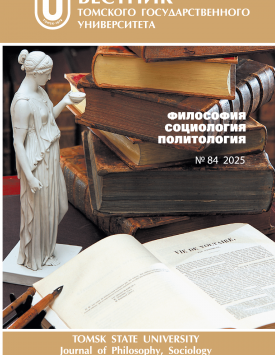Global turn from neoliberal to post-neoliberal governmentality and contours of the new normal
The article discusses global changes in the practices and ideology of govemmentality following the recession of the neoliberal “wave”. Characteristic features of post-neoliberal govemmentality are identified: the rejection of economic priorities; the continuation of the previously outlined line of depolitising citizens; de-legalisation, i.e. the displacement of legal norms by “technical” regulation; globality; the strengthening of biopower. The techniques of govemmentality, which seeks to take control not only of people’s bodies but also of their thoughts and emotions, are being perfected. An important innovation is the gradual transformation of civil society into a means of disciplining the population. The state, too, has not stopped inventing new technologies of exclusion, whose development was stimulated by the emergency regime of the pandemic era. The new normal is characterised by the state machine’s perception of every individual as a potential source of danger. The approaches to conceptualising post-neoliberal governmentality proposed by various political theorists are considered. The author considers the concept of depolitisation of the citizen and policisation of the state proposed by Agamben and developed by his followers, including Russian ones, as the most promising for interpreting the new normal. Using Agamben’s metaphor of destituent power, the author argues that the world is witnessing an increasingly explicit removal of the supreme power from fundamental political decision-making by the state apparatus. Destituent power is a manifestation of the power of the state machinery, which makes the state of emergency the new norm and deprives the sovereign of real authority, i.e. dismantles supreme power itself. As a result, the ruling bureaucracy is in fact usurping sovereignty, which the author sees as a very dangerous trend, fraught with a new totalitarianism. The final part of the article examines the alternatives offered by political science to the global triumph of post-neoliberal governmentality, and the author concludes that none of the theorists has so far managed to formulate a convincing and realistic programme for getting out of the negative scenario of global political development. The author declares no conflicts of interests.
Keywords
post-neoliberal governmentality,
new normal,
governmentality,
neoliberalism,
FoucaultAuthors
| Kostogryzov Pavel I. | Institute of Philosophy and Law, Ural Branch of the Russian Academy of Sciences | pkostogryzov@yandex.ru |
Всего: 1
References
Sainz Pezonaga A. Where is Spinoza’s Free Multitude Now? // Stasis. 2022. V. 12, № 1. P. 228-249.
Третьяк А.Р. Классовый проект multitude // Полития: Анализ. Хроника. Прогноз (Журнал политической философии и социологии политики). 2020. № 4 (99). С. 35-52. doi: 10.30570/2078-5089-2020-99-4-35-52.
Хардт М., Негри А. Множество: война и демократия в эпоху империи. М. : Культурная революция, 2006.
Gaete-Silva J., Gaete A. Disruptive Behavior in the Postdisciplinary Society // Front. Psychol. 2021. Vol. 12. Р. 740856. doi: 10.3389/fpsyg.2021.740856.
Шавеко Н.А. Основные модели глобальной демократии: теоретический анализ // Дискурс-Пи. 2023. Т. 20, № 3. С. 10-25. h doi: 10.17506/18179568_2023_20_3_10 244 Политология /Political science.
Костогрызов П.И. Децизионизм в России: дореволюционные предшественники и современные интерпретаторы Карла Шмитта. Ч. 2 // Научный журнал «Дискурс-Пи». 2021. № 2 (43). С. 36-48. https://doi.org/10.17506/18179568_2021_18_2_36.
Агамбен Дж. Средства без цели. Заметки о политике. М. : Гилея, 2015. 148 с.
Костогрызов П.И. Верховная власть: «забытая» категория политической науки? // Политая. 2021. № 4. С. 163-182. doi: 10.30570/2078-5089-2021-103-4-163-182.
Яркеев А.В. Рождение чрезвычайного государства из духа вечности политического тела // Logos et Praxis. 2022. Т. 21, № 1. С. 11-21. doi: 10.15688/lp.jvolsu.2022.1.2.
Костогрызов П.И. Децизионизм в России: дореволюционные предшественники и современные интерпретаторы Карла Шмитта. Ч. 1 // Научный журнал «Дискурс-Пи». 2021. № 1 (42). С. 62-76. doi: 10.24412/1817-9568-2021-1-62-76.
Яркеев А.В. Теологические основания современной власти: опыт деконструкции // Антиномии. 2021. Т. 21, вып. 1. С. 7-26. doi: 10.24412/2686-7206-2021-1-7-26.
Давыдов Д.А. Посткапитализм как архаизация: институциональный дрейф к неофеодализму? // Антиномии. 2021. Т. 21, вып. 4. С. 61-78. doi: 10.17506/26867206_2021_21_4_61.
Зволев Н.П. Возвращение homo politicus в условиях неолиберальной правительности // Манускрипт. 2020. Т. 13, Вып. 8. С. 126-130. doi: 10.30853/manuscript.2020.8.22.
Ерохов И.А. Постглобализация и политическая архаизация в России // Мировая политика. 2020. № 2. С. 1-25. doi: 10.25136/2409-8671.2020.2.33335.
Crouch C. Post-Democracy After the Crises. Cambridge : Polity, 2020. 200 p.
Зубофф Ш. Эпоха надзорного капитализма. Битва за человеческое будущее на новых рубежах власти. М., 2022.
Laruffa F. Making Sense of (Post)Neoliberalism // Politics & Society. 2023. 0(0). doi: 10.1177/00323292231193805.
Делёз Ж. Переговоры. 1972-1990 / пер. с фр. В.Ю. Быстрова. СПб. : Наука, 2004. 235 с.
Ehrenberg A. Weariness of the Self: Diagnosing the History of Depression in the Contemporary Age. McGill-Queen’s University Press, 2010.
Davies W., Gane N. Post-Neoliberalism? An Introduction // Theory, Culture & Society. 2021. Vol. 38, № 6. Р. 3-28. doi: 10.1177/02632764211036722.
Свасьян К..но еще ночь. М., 2013. 448 с.
Хардт М., Негри А. Империя. М. : Праксис, 2004. 440 с.
Попов Д.В. Управление жизнью: философско-антропологические основания, потенциал и перспективы биополитики: дис.. д-ра филос. наук. Омск, 2023. 388 с.
Шемякин Я.Г. Модернизация как процесс межцивилизационного взаимодействия // Цивилизации. Вып. 10: Модернизация и цивилизационные вызовы ХХІ века. М. : Наука, 2015. С. 124-138.
Филиппова Н.А. Постправовое государство: Российская конституционная реформа в региональном и глобальном конституционном процессе // Право и правоприменение в современной России : материалы Всерос. науч.-практ. конф. с междунар. участием, Новосибирск, 24-26 сентября 2020 года. Новосибирск : Новосиб. нац. исслед. гос. ун-т, 2020. С. 100-104.
Нерсесянц В.С. Философия права. М. : Норма, 1997.
Рувинский Р.З. Регулирование на основе данных: от верховенства права к публичным программам лояльности // Антиномии. 2023. Т. 23, вып. 1. С. 123-147. doi: 10.17506/26867206_2023_23_1_123.
Рувинский Р.З. Правовые аспекты внедрения системы социального кредита в современное публичное управление. Н. Новгород : НИУ РАНХиГС, 2022.
Журбина И.В. Неолиберальный тип демократии: стратегия «исключения» политического // Дискурс-Пи. 2022. Т. 19, № 3. С. 70-85. doi: 10.17506/18179568_2022_19_3_70.
Агамбен Дж. Государственная безопасность и демократия. К теории разучреждающей власти. Лекция, прочитанная в Афинах 16 ноября 2013 г. URL: http://s357a.blog-spot.com/2014/02/blog-post_14.html#more.
Фуко М. Интеллектуалы и власть. Ч. II. М. : Праксис, 2005.
Фуко М. Рождение биополитики : пер. с фр. СПб. : Наука, 2010. 448 с.
Зиновьев A.A. На пути к сверхобществу. М. : Центрполиграф, 2000.

